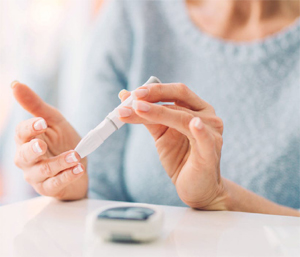
What is Diabetes?
Diabetes is a condition in which person has high blood sugar. it can be due to 1
Inadequate insulin production
Body’s cell donot respond to insulin
1 and 2 as well
Earlier it was said that people over 30 year get diabetes and the incidence increases with age .
Types
There are three major variety of Diabetes: Type 1, type 2, and gestational diabetes.
Type I diabetes : Also known as juvenile diabetes, this type occurs when the body fails to produce insulin. People with type I diabetes are insulin-dependent, which means they must take artificial insulin daily to stay alive.
Type 2 diabetes : Type 2 diabetes affects the way the body uses insulin. While the body still makes insulin, unlike in type I, the cells in the body do not respond to it as effectively as they once did. This is the most common type of Diabetes, according to National Institute of Diabetes and Digestive and Kidney diseases. It has major relation to obesity
Gestational diabetes : This type occurs in women during pregnancy when the body can become less sensitive to insulin. Gestational diabetes does not occur in all women and usually resolves after giving birth.
Prediabetes
- Doctors refer to some people as having prediabetes or borderline diabetes when blood sugar is usually in the range of 100 to 125 milligrams per deciliter (mg/dL).
- Normal blood sugar levels sit between 70 and 99 mg/dL, whereas a person with diabetes will have a fasting blood sugar higher than 126 mg/dL.
- The prediabetes level means that blood glucose is higher than usual but not so high as to constitute diabetes.
- People with prediabetes are, however, at risk of developing type 2 diabetes, although they do not usually experience the symptoms of full diabetes.
Risk factors
The risk factors for prediabetes and type 2 diabetes are similar. They include:
- being overweight
- a family history of diabetes
- having a high-density lipoprotein (HDL) cholesterol level lower than 40 mg/dL or 50 mg/dL
- a history of high blood pressure
- a history of polycystic ovary syndrome (PCOS)
- Prolonged Emotional stress
- being more than 45 years of age
- having a sedentary lifestyle
Symptoms
Both types of diabetes has same signs and symptoms
Hunger and fatigue : Your body converts the food you eat into glucose that your cells use for energy. But your cells need insulin to bring the glucose in.
If your body doesn’t make enough or any insulin, or if your cells resist the insulin your body makes, the glucose can’t get into them and you have no energy. This can make you more hungry and tired than usual.
Frequent Urination and Increased thirst : Normally a person urination around 4 -7 times in 24 hours but people with Diabetes has increased frequency of urination. Body reabsorbs glucose as it passes through the kidneys but when diabetes increases your blood sugar levels, kidneys may not be able to bring it all back . this causes increased urination and as you urinate more it causes increased thirst as well
Dry mouth and itchy skin : as body uses Excessive fluids for urination,it causes less moisture in skin
Blurred vision
Slow healing sores and cuts
Pain or numbness in feet and legs
Unplanned weight loss
Causes
Type 1 Diabetes : Type 1 diabetes occurs when your immune system, the body’s system for fighting infection, attacks and destroys the insulin-producing beta cells of the pancreas. Scientists think type 1 diabetes is caused by genes and environmental factors, such as viruses, that might trigger the disease.
Type 2 Diabetes : Type 2 diabetes—the most common form of diabetes—is caused by several factors, including lifestyle factors and genes.
- Overweight, obesity, and physical inactivity
- Insulin resistance
- Genes and family history
Gestational diabetes : It is a type of diabetes that develops during pregnancy, is caused by the hormonal changes of pregnancy along with genetic and lifestyle factors.
- Insulin resistance
- Hormones produced by the placenta, during pregnancy contribute to insulin resistance.
- Being overweight or gaining too much weight during pregnancy may also be a factor for gestational diabetes
- Genes and Family history
How homeopathy helps?
- Helps in controlling blood sugar levels along with hypoglycemic drugs
- Helps in managing symptoms of Diabetes
- Helps in preventing progress and complicationsof Diabetes
- Helps in healing wounds faster
- Helps in preventing numbness and tingling of nerves
- Helps in developing immunity stronger to fight other infections
All Diseases
Opening Hours
- Monday To Saturday 11:00 AM - 1:00 PM
6:00 PM - 8:00 PM - Sunday Closed